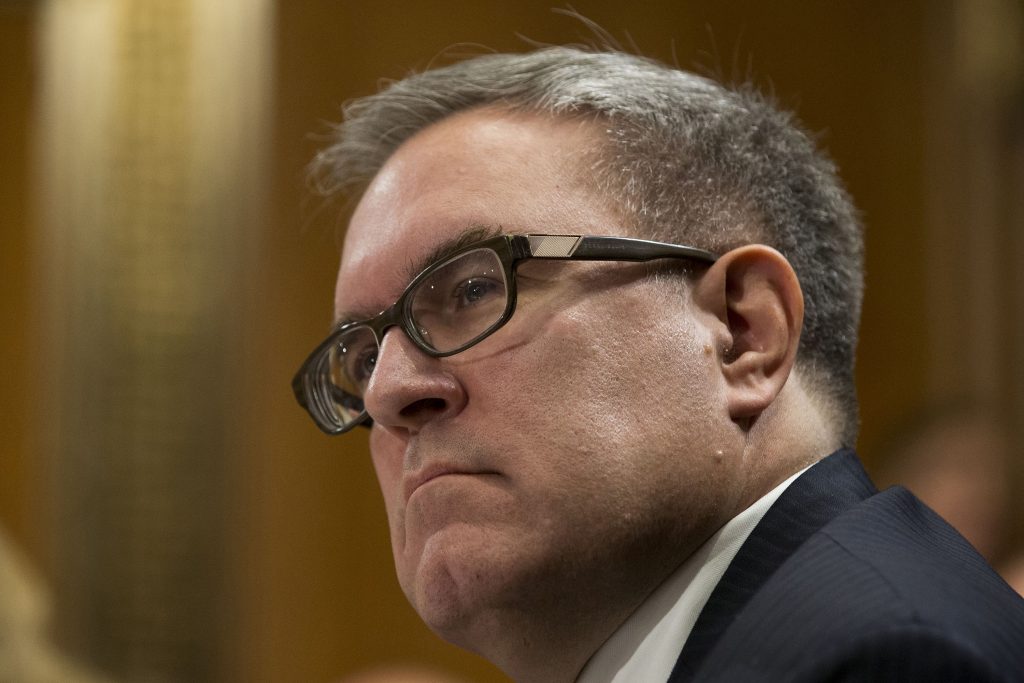Helton: The new EPA plan could devastate Iowa, but not without a fight
Iowa AG Tom Miller joined 18 others states in opposing the agency’s disastrous new direction.
Andrew Wheeler during his confirmation hearing to be Deputy Administrator of the Environmental Protection Agency before the United States Senate Committee on the Environment and Public Works on Capitol Hill on Nov. 8, 2017 in Washington, D.C. (Alex Edelman/CNP/Zuma Press/TNS)
August 28, 2018
I often wonder if any of the controversy in the Trump administration really matters here in Iowa City, 900 miles or so from the White House. But buried underneath the dirty, polluted news cycle, there’s actual pollution, and it very well might kill us.
That’s not just me being dramatic. The Environmental Protection Agency said so in its report of its new climate plan. EPA officials estimate that 1,400 Americans will die as a result of their plan to roll back regulations set during President Barack Obama’s administration by rewriting the rules for coal power and other climate-change protections. Dirtying the air with more coal is expected to increase asthma attacks and other life-threatening respiratory problems. It seems that the EPA is no longer in the business of protecting the environment.
Let’s break down what’s going on here. In 2016, the United States signed the Paris Agreement with nearly every other nation. The basics of the accords was for every country to set its own strategy for reducing its greenhouse-gas emissions. The U.S. plan, known widely as the Clean Power Plan, was proposed by the EPA in 2015, even before the Paris Agreement. The plan focuses on lowering the amount of energy produced by coal-powered plants as driving force behind cutting U.S. greenhouse-gas emissions. An ambitious outline for how to reduce emission was, and remains, the bedrock of combating global climate change.
Then Donald Trump became the president, endowed with the power of the EPA and selecting its leadership. This is the guy who said, “The concept of global warming was created by and for the Chinese.” He later walked it back as a joke, clarifying that global warming is “just a very, very expensive form of tax,” but it’s clear the current president prioritizes high-polluting energy over the well-being of the American people. Under the president’s leadership, former EPA head Scott Pruitt launched a repeal of the Clean Power Plan in an attempt to please lobbyists for unsustainable energy.
But the plan isn’t going in the trash just yet. Iowa Attorney General Tom Miller has joined 18 states, Washington, D.C., and seven other cities and counties in opposing the disastrous, radical changes. In its joint release, the coalition states that the EPA’s reinterpretation of the Clean Power Plan is “contrary to law and arbitrary and capricious.”
It seems that the EPA is no longer in the business of protecting the environment
While approximately 40 percent of state AGs is a formidable opposition, what’s more impressive is the diversity of states involved: from Vermont to New Mexico to North Carolina. Iowa is joined by its Midwestern neighbors Minnesota and Illinois, as well. The cross-country effort was highlighted by Lynn Hicks, Miller’s communications director.
“Federal solutions are necessary to address climate change,” Hicks said. “Iowa could fully switch its energy generation to wind and other renewables, for example, but it would still feel the effects of carbon emissions from other states.”
The new EPA plan isn’t just bad for asthmatics near coal plants, it’s bad for Iowa farmers, too. Because of rising temperatures, it’s estimated that Iowa’s corn yields could decrease 18 percent or more, costing farmers in our state billions of dollars.
I asked Hicks if there was some sort of plan if the costly and dangerous Clean Power Plan repeal went into effect. While he said that was outside the purview of the Attorney General’s Office, he said the state Legislature discontinued its Climate Change Advisory Council in 2011.
Just like the Clean Power Plan, we don’t get a second chance at protecting the Earth. If we lose it, there’s no going back.














